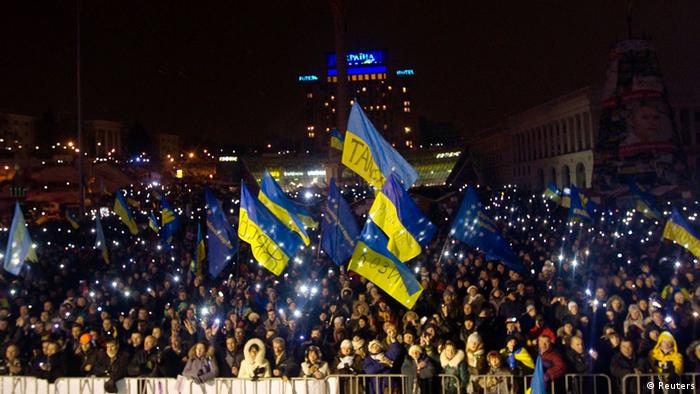Understanding the geography of Ukraine !

What caused the protests?
- The
trigger was the government's decision not to sign a major partnership deal
with the EU, despite years of negotiations aimed at integrating Ukraine
with the 28-nation bloc. That decision was announced on 21 November.
- Thousands
of pro-EU Ukrainians poured onto the streets of the capital, urging
President Yanukovych to cancel his U-turn and go ahead with the EU deal
after all. He refused, and the protests continued.
- On
30 November in the early hours riot
police waded in heavily to break up a student protest, leaving
dozens of people injured.
 |
- Anger
at the TV pictures only fuelled anger with President Yanukovych, and
boosted the crowds in Independence Square.
- The
authorities sought to defuse the anger through measures such as the suspension of the mayor of Kiev and release of detainees.
- On
17 December, Russia and Ukraine announced
a major deal under which Russia would buy $15bn-worth
(£9.2bn; 10.9bn euros) of Ukrainian government bonds and slash the price
of Russian gas sold to Ukraine.
- The
deal - of critical importance to Ukraine at the time when the country is
struggling to avoid default - appeared to take the wind out of the sails
of the protest movement, with the number of demonstrators dwindling.
- But
when a pro-opposition journalist, Tetyana Chornovol, was beaten up by
unknown assailants on Christmas Day there
was an outcry.
- The
approval of tough new laws to curb street protests then appeared to
further fuel the anger in Kiev.
-----------------------------------------------------------------------------------------------------
Who are the protesters?
- The
protesters are mainly from the Kiev area and western Ukraine, where there
is a greater affinity with the EU, rather than in the Russian-speaking
east and south - though they include eastern Ukrainians too.

- Parliament's
three opposition movements have all been involved in the protests. Vitali Klitschko, the former world
heavyweight boxing champion and leader of the Udar (Punch) movement, has
been a prominent demonstrator. He is very pro-EU and plans to run for
president in 2015.
- One
of the most important Ukrainian protesters is Arseniy Yatsenyuk,
parliamentary leader of the country's second biggest party, called
Fatherland. He is an ally of former PM Yulia
Tymoshenko, a former prime minister now in jail, who is an
arch-rival of the president.
- A
new development since Ukraine's last major round of unrest, in the 2004 Orange Revolution, is the
presence of ultra-nationalists. The far-right group called Svoboda (Freedom) is also
protesting, led by Oleh Tyahnybok (pictured second from left).
- Another
radical right-wing group, which has been blamed for trying to provoke the
police, is Bratstvo (Brotherhood), which is not a parliamentary party. And
yet another, Right Sector, was linked to clashes in January.
-----------------------------------------------------------------------------------------------------
Why is Yulia Tymoshenko important?


- Internationally, Tymoshenko has become a
symbol of opposition to Mr Yanukovych, and a cause celebre in the EU.
- She was jailed in 2011 for criminally
exceeding her powers over a gas deal with Russia in 2009, and is serving a
seven-year sentence. Many EU politicians accept her allegation that her
trial was politically motivated. The European Court of Human Rights did
not go as far but did rule that her pre-trial detention had been
"arbitrary and unlawful".
- Critics of Tymoshenko argue the abuse of
office conviction was just the tip of the
iceberg. They allege that she lined her pockets as
prime minister while betraying the Orange Revolution in which she played a
key role.
- The EU set her release as a key condition for
signing the association agreement with Ukraine - but Mr Yanukovych
resisted the pressure to free her. Tymoshenko says she has a serious back
ailment and wants to get treatment in Germany.
-----------------------------------------------------------------------------------------------------
How has the West reacted?
- The
EU's official position is that the door remains open for Ukraine to sign
the association agreement but it has put any new negotiations on hold until
there is a clear commitment to sign.
- EU
foreign ministers have
sought to reassure Russia that
the deal would not undermine Moscow's interests.
- Washington
has said it is considering
all options, including sanctions, towards
Ukraine's leaders after the crackdown on 30 November.
- US
Secretary of State John Kerry expressed "disgust" at the
decision by the authorities to "meet the peaceful protest... with
riot police, bulldozers, and batons".
- Both the EU and US have condemned the tough new anti-protest laws, saying they are incompatible with Ukrainians' democratic aspirations.
-------------------------------------------------------------
Is Russia pulling the strings in Kiev?
Is Russia pulling the strings in Kiev?
 |
- To
many observers, the deal struck between Russia and Ukraine on 17 December
points to a carrot-and-stick
approach by the Kremlin.
- Mr
Yanukovych's abrupt snub to the EU came after Russia exerted strong
economic pressure on Ukraine.
- The
2004 Orange Revolution led to Mr Yanukovych's removal from power after his
election was judged to have been fraudulent. Russia backed him then - and
backs him now.
- In the run-up to the EU decision, Russia imposed time-consuming border checks and a ban on Ukrainian sweets - and threatened other measures.
- Apart
from Ukraine's heavy reliance on Russian gas, many Ukrainian firms -
especially in the country's Russian-speaking east - depend on sales to
Russia.
- Mr
Yanukovych, who was democratically elected in 2010, still has a strong support base in eastern and
southern Ukraine, and there have been street demonstrations by his
supporters.
- For
centuries Ukraine was controlled by Moscow and many Russians see Ukraine
as vital to Russian interests.

